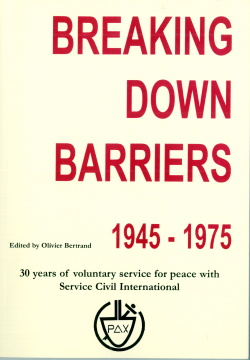Martin Pierce
Joining SCI
In summer 1970 a friend told me he was going to a workcamp in Dharamsala in North India. Knowing nothing about workcamps or SCI, I decided this would be fun and went along with him, without applying through SCI India. We walked in one day late. Fortunately for me (not for him!), the camp leader, John Hitchins, was in hospital with hepatitis and nobody objected to my presence.
The Dharamsala workcamp was a significant ‘peak experience’. So many different strands of what I was looking for came together and I felt that I had arrived ‘home’. On reflection this can be explained by:
- I had trained to be a lawyer, but I had no interest in law as a career and was searching for a more fulfilling alternative
- I had been brought up in ‘privileged’ India as a child, had received a privileged education, and had been working as a volunteer teacher in an elite school in Punjab, India – the simplicity of the basic living conditions of the workcamp was a soothing contrast
- I felt accepted and stimulated by a friendly, inclusive group of people
- the manual labour was a very welcome antidote to my customary, more cerebral world
- the history and philosophy of the organisation, with its pacifist, nonviolent roots and principles, were ones that I fully identified with.
My expectations arising from the workcamp were essentially that I had found an organisation that had provided me, and could continue to provide me, with an experience of feeling complete.
My experience with SCI - dates and positions held:
- 1970–1971 Attended workcamps in India, including relief work in refugee camp near Calcutta for Bangladeshi refugees (during holidays whilst teaching with Voluntary Service Overseas in Punjab)
- 1972–1974 Long-term volunteer with SCI India – mostly spent working as Co-ordinator of Nangloi project in Delhi
- 1975–1977 SCI volunteer, with wife Juliet, at Regional Training Centre in Visionville; attended and led several workcamps during this time
- 1980–1984 IVS staff member – Field Officer for North of England
- 1985–1987 Chairperson, IVS National Committee
Enjoyable aspects
- Friendships: SCI provided an opportunity to join a welcoming group of lively, thoughtful individuals from a wide range of cultures and backgrounds
- Meaningful work: SCI activities offered easy access to a committed and rewarding engagement with groups of people and their worlds who otherwise would have been beyond contact
- SCI ideology: SCI’s history, reflected particularly in its first generation members and their stories, was an inspiration. It served as a healing response to some of my deeper questions and fears: the threat of war, especially nuclear war; the prevalence of violence and conflict, within families, communities and states; the discrepancy between the so-called ‘rich’ and ‘poor’; the divisions that seemed to dominate relationships between people, their beliefs and customs.
- Simplicity of a shared lifestyle: maybe being a twin helps, but I found the interdependent, communal, unadorned culture of workcamps and long-term projects to be congenial at a deeply satisfying level. It was restorative after a dislocated, privileged and somewhat alienating life up to that point.
The following were particularly pleasant experiences:
- First workcamp – a life-changing experience!! And numerous other workcamps, too.
- Being accepted, and having a sense of belonging, at the heart of the organisation in India, with the Seshans as the principal instigators
- Meeting Juliet and, 5 years later, deciding to get married
- Time in Visionville with the Sato family – extraordinarily rich and stimulating times
- Organising or participating in more political workcamps with overt ‘peace’ and ‘non-violence’ themes, for example: at Torness nuclear power station; Molesworth nuclear air base; Milton Keynes Peace Pagoda; New Relationship camp, Wakefield (with adults with learning difficulties).
Some less happy experiences
- Being caught up in occasional serious and destructive conflicts, for example: between local groups and national office in India; between an Indian volunteer and myself in Nangloi project; within the local group in Bangalore; within the teenage programme in Leeds
- Unproductive meetings, usually at a national branch level
- Being present when Nangloi and other SCI India projects were criticised by international committee members, mostly from some branches in Europe
- Contributing to polarised arguments about what SCI should be doing – often characterised as being between the ‘idealists’ and the ‘pragmatists’. I identified with the ‘idealists’!!
An anecdote
One day on my first workcamp in Dharamsala it was raining hard and the workcamp team decided that it would be a rest day. However, I was so exhilarated by my new found purpose in life that I set off on my own, with crowbar in hand, up the rather steep hill to the work site. There I happily spent the day trying to break up the rock-face so that foundations for an orphanage could be laid. My enthusiasm was impressive but largely ineffective, particularly in contrast with the six Tibetan women besides me who were rhythmically and collaboratively splitting the rocks with far less effort and singing all the while. One wonderful aspect of SCI has always been that, for the most part, its volunteers may not ‘have a clue’ or be highly productive but their aspiration and commitment is what makes a difference.
My thoughts on the work
In my experience the short-term workcamps were mostly highly successful and had a significant impact on the majority of those that took part. In my view they are a very effective means of breaking down barriers between people, through the combined impact of socially productive work tasks, shared communal living, and the explicit ideology and objectives of the organisation.
The long term projects were, in my experience, less satisfying, being more complex and requiring a degree of management skills and life experience that were generally undeveloped in most of the volunteers. However, the experience and learning resulting from being given responsibility beyond what was merited were themselves highly valuable.
I never expected that SCI would contribute significantly to world peace and the abolition of discrimination and poverty. What mattered more was the opportunity to find out the power of what collaboration and working together can achieve and the importance of symbolic action.
As I look back
What I miss about my years in SCI are the ‘camraderie’, the sense of purpose, the internationalism, the innocent idealism and the sense of finding a ‘home’ outside in the world of work. I have no regrets about leaving and moving on and exploring other possibilities, but I have a deep and lasting affection for the organisation and the people in it. This is reinforced strongly when meeting up with SCI friends, and, particularly, at the recent get-together of the `70’s vintage of SCI in Birmingham.
Of the many organisations that I have been involved with subsequently, none has been as rewarding in such a complete way. Other organisations have been more effective, or better managed, or less conflicted, but none has taught me so much about what works well, what inspires and what heals. I think this is primarily because SCI more completely involves a person’s belief system, their working life and the way they relate socially to their fellows, whether on the basis of friendship or merely shared space.
My appreciation today of SCI aims
As I interpret these aims, they seem more relevant than ever and timeless. I would characterise them as:
- Primarily using manual work as a practical means of giving people the experience of solidarity and of connectedness, beyond divisions of ideas, attitudes, customs and privilege
- Demonstrating that we all have more in common than whatever serves to divide us
- An explicit ethos of sharing, equality and co-operation, both in work and in our domestic and social living, which provides an experience that is integrative, rewarding and humanising
- Targeting situations that stimulate division and conflict and bringing a healing and humanising dynamic which leads to change in the situation and within individuals (hosts and visitors)
- Particularly in short-term workcamps, to offer the opportunity for groups of people to take responsibility to make a heaven or a hell of their time together.
Of its efficiency
I wouldn’t want to pretend that SCI is any more efficient than other organisations – however, as mentioned above, I would claim that workcamps as a methodology are highly efficient in achieving the aims of the organisation. I consider that SCI has been less efficient in its organisational management and development, especially in the following respects:
- Its pacifist ideology was and is highly relevant and contributive when compulsory military service exists; however, with its abolition in many countries, the objective of providing alternative military service was reduced in importance and I don’t think SCI has found a successful replacement for this focus; its role as a pacifist or peace organisation has diminished over the years
- In many countries the explicit ‘peace’ or ‘non-violence’ objectives have been seen to be too exclusive, and there has been a tendency to try to attract as many, mostly young, people as possible by underplaying the traditional ideologies and maximising its ‘convenience’ for student priorities; this, to my mind, has largely deprived the organisation of its power and impact to play a part in healing complex and deeply rooted conflicts.
- I don’t think there is a sufficiently strong belief in the ‘workcamp’ methodology to apply it to situations that have the ability to be ‘transformative’ – I was always more excited when there was a political or social change dynamic to the work activities; during the end of my time with IVS I felt the more challenging aspects of the organisation were being replaced by ‘safer’, less inspirational aspirations.
Personal benefits
- Lifelong friends and a partner – and, consequently, two children!
- Some great memories
- The opportunity to grow up and develop in a stimulating and affectionate environment
- An outlet for cherished beliefs and idealism
- An escape from a professional career in law
- The chance to reconcile some of the conflicts of growing up in ‘airconditioned’ India
- Years spent learning first-hand about development
SCI’s impact on others
From continued contact with very many of my colleagues from working in India, and, less so, from my days in IVS, it seems that, to a greater or lesser extent, the experience of working with SCI has been mostly positive and rewarding.
As frequently mentioned above, I think workcamps generally have a significant impact on the lives of most of the participants. Because many of SCI’s work projects took international teams to places and to people that would, otherwise, not be exposed to international and idealistic groups of people, I imagine there has been a beneficial impact, too, on our hosts.
Relevance to the requirements and spirit of the times
Not much has changed that would make SCI less relevant. Divisions and conflicts at a personal, communal, and international level require just as imaginative and transformative commitments from individuals. Whilst alternatives to military service may no longer be as much required, given the voluntary nature of most armed services, the visible demonstration of the power of individuals, whatever their superficial differences, to transform divisions and conflicts in the world remains as essential as ever.
Lasting impact - on politics or career
My politics were largely taking shape before joining SCI and were a reason for joining it. They have not changed much.
After SCI I worked in peace education, mediation and conflict management, and international development. What I bring to these areas of work was incalculably shaped by the experiences of working in SCI India and IVS.
On travel
Not sure how much the urge to travel was planted by an early childhood spent in India, or how much by working in India as an adult. Both have ensured that I now spend more time outside my home in the UK and more time in countries in West Africa.



